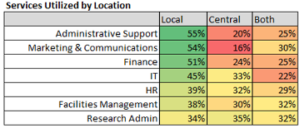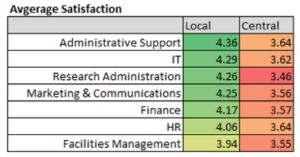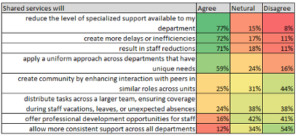
Local support is necessary for effective work, according to a survey of U faculty and staff, who are concerned that sharing some administrative services may prevent their colleges and departments from receiving help to meet their unique needs.
The survey was designed to gauge faculty and staff perceptions as the university considers proposals to share some administrative functions among the College of Humanities, College of Science, College of Social and Behavioral Sciences and the School for Cultural and Social Transformation.
It was distributed to 1,314 faculty and staff members within the four units and was in the field from Oct. 28 to Nov. 8. It was a collaboration with the Office of Financial Services, which was simultaneously conducting a university-wide survey to assess faculty and staff perceptions of local and centralized support. The response rate was 20.7%, with 272 total responses.
The survey focused on evaluating services across various functional areas, including finance, human resources, information technology, research administration, marketing and communications, facilities management and general administrative support. Participants were asked whether they had experienced these services at the central campus, at the local college level, or both.
Results showed that administrative support, marketing and communications and finance were more frequently utilized at the local level than at the central level, while services in research administration, information technology and human resources were more evenly distributed centrally.
The average satisfaction levels for all services ranged between “fair” (3) and “excellent” (5) on a five-point Likert scale, with an overall mean satisfaction score of 3.8, indicating generally positive sentiment. Respondents expressed the highest satisfaction with local administrative support, while central research administration received the lowest satisfaction rating.
When looking at perceptions of shared services, respondents expressed concerns about the loss of specialized support for their departments. A faculty member observed, “Coordination across units to share knowledge and provide backup is a great idea, but loss of local expertise would lead to lower efficiency and more work being done by faculty.”
Faculty and staff were not optimistic about the possibility of shared services creating more community and career development opportunities for staff or allowing for more consistent support across departments. Instead, faculty and staff expressed concern that shared services would result in staff reductions and diminished community. “I work very closely with the staff, students, and faculty in my department, and the possibility of this shared services model pulling me away from my team is very disconcerting,” a staff member said.
Data from the survey is being utilized along with information from a series of listening sessions and online feedback to help inform the ongoing shared services project. Analysis of the feedback was shared during a Dec. 11 town hall meeting. (View a summary of the listening sessions and online feedback, as well as recommendations that will be considered as the shared services project continues online.)
For more information about the project and responses to some common questions, visit the FAQ webpage. Additional feedback can be shared through the online form.



